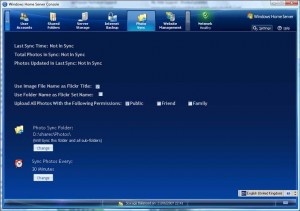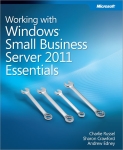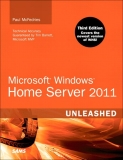PhotoSync Beta2 for WHS is Available!
Ed Holloway has posted on his blog that Beta2 of PhotoSync for Windows Home Server is available.The new version has several tweaks, bug fixes and numerous enhancements.
PhotoSync monitors your WHS Photos folder or a sub folder within it and automatically uploads the contents to your Flickr account. You can select which photos you would like to make public, so your private ones are not uploaded and the frequency this happens can be scheduled also.
More information is available from Ed Holloway’s Blog. Including the download link.
Ed has also posted a link to a nice install guide for PhotoSync from TechRepublic. As he states “This is from PhotoSync Beta1, so some screenshots will be different”
Share this WHS Article with Others:





If you have anything other than JPG files on the folder(s) you want to share PhotoSync Beta1 or Beta2 will not work. Lucky for you I have made a script that will remove all file that are not JPG and put them on a seperate file for you sorted by File extension.
‘Option Explicit
‘On Error Resume Next
‘USER ACCEPTANCE – SCRIPT DESCRIPTION
intAnswer = Msgbox(“This script lets you select a directory” & vbcrlf & _
“and asks you which type of files you want to keep in that directory.” & vbcrlf & _
“It will then proceed to remove all files (exept the ones you want to keep) ” & vbcrlf & _
“and will put them on a directory called removed_files.” & vbcrlf & _
“Do you understand and wish to continue?”,vbYesNo,”USER ACCEPTANCE”)
If intAnswer = vbYes Then
Set WshShell = WScript.CreateObject(“WScript.Shell”)
Set objFSO = WScript.CreateObject(“Scripting.FileSystemObject”)
Set strRootPath = objFSO.GetFolder(WshShell.CurrentDirectory)
‘SETUP LOG FILE.
strLogFile = “move_files.log”
Const ForReading = 1, ForWriting = 2, ForAppending = 8
Set objLogFile = objFSO.OpenTextFile(strLogFile, ForWriting, True)
objLogFile.WriteLine “Generated on: ” & Date & ” ” & Time
objLogFile.WriteLine “”
‘FILE EXTENSION FROM USER INPUT
strFileExtension = InputBox(“Please type the file extension of the files you want to keep (i.e. JPG).”,”Extension of files to keep”)
‘SETUP FILE BROWSER AND DESTINATION.
Const MY_COMPUTER = &H11&
Const WINDOW_HANDLE = 0
Const NO_OPTIONS = 0
intAnswer = vbNo
Do While intAnswer = vbNo
Set objShell = CreateObject(“Shell.Application”)
Set objFolder = objShell.BrowseForFolder (WINDOW_HANDLE, “Select a folder or type the full path to folder:”, &H10&, objShell.Namespace( MY_COMPUTER ))
If objFolder Is Nothing Then
strSourceFolder = “”
intAnswer = vbYes
Else
Set objFolderItem = objFolder.Self
strSourceFolder = objFolderItem.Path
‘USER VERIFICATION
intAnswer = Msgbox(“You selected: ” & strSourceFolder & vbcrlf & _
“Is this the directory from which you want to remove all files ” & vblf & _
“that do not match the file extension ” & strFileExtension & ” ? “,vbYesNo,”User Verification”)
End If
Loop
‘START FILE COUNTER
intFileCounter = 0
intFolderCOunter = 0
intRemoveFileCounter = 0
‘VERIFY USER SELECTION
If objFSO.FolderExists(strSourceFolder) Then
‘DECLARE DESTINATION FOLDER
strDestinationFolder = strSourceFolder & “\removed_files”
‘CREATE SOURCE FOLDER and SUBFOLDERS LIST
Set objFolders = objFSO.GetFolder(strSourceFolder)
Set objSubfolders = objFolders.Subfolders
‘CREATE DESTINATION FOLDER
If Not objFSO.FolderExists(strDestinationFolder) Then
objFSO.CreateFolder(strDestinationFolder)
‘makeMsgBox = MsgBox(“Created” & strSourceFolder & “\remove_file\”)
End If
‘WRITE TO LOG FILE
objLogFile.WriteLine “Looped Thru:” & vbrc
‘CREATE FILE LIST FROM MAIN FOLDER
Set ArrMainFiles = objFSO.GetFolder(strSourceFolder).Files
‘LOOP THROUGH LIST
For Each File In ArrMainFiles
If Not UCase(Right(File.name,Len(strFileExtension))) = strFileExtension Then
‘RENAME DUPLICATE FILES
If objFSO.FileExists(strDestinationFolder & File.name) Then
makeMsgBox = MsgBox(“file: ” & strSourceFolder & File.name & ” exists already!, renaming to” & strDestinationFolder & “\” & “copy_” & File.name)
objFSO.MoveFile strSourceFolder & “\” & File.name, strDestinationFolder & “\” & “copy_” & File.name
If Err Then
objLogFile.WriteLine “File NOT moveded (” & Err.Number & “: ” & Err.Description & “): ” & objFile.Name & ” to ” & strDestinationFolder & strChildFolderName
End If
‘MOVE ALL OTHER FILE TYPES to the REMOVE_FILES folder
Else
‘CREATE SUBFOLDERS IN DESTINATION FOLDER
If Not objFSO.FolderExists(strDestinationFolder & “\” & objFSO.GetExtensionName(File.Name)) Then
objFSO.CreateFolder(strDestinationFolder & “\” & objFSO.GetExtensionName(File.Name))
End If
makeMsgBox = MsgBox(“Moving file: ” & strSourceFolder & File.name & vbcrlf & ” into to ” & strDestinationFolder & “\” & objFSO.GetExtensionName(File.Name) & “\”)
objFSO.MoveFile strSourceFolder & “\”& File.name, strDestinationFolder & “\” & objFSO.GetExtensionName(File.Name) & “\”
If Err Then
objLogFile.WriteLine “Other Files Types could not get moveded (” & Err.Number & “: ” & Err.Description & “): ” & objFile.Name & ” to ” & strDestinationFolder & strChildFolderName
Else
intRemoveFileCounter = intRemoveFileCounter + 1
End If
End If
‘REPORT ERROR
Else
‘objLogFile.WriteLine “File IGNORED (incorrect file extension): ” & objFile.Name
End If
intFileCounter = intFileCounter + 1
Next
‘END OF LOOP THROUGH LIST
If Err Then
objLogFile.WriteLine “File NOT deleted (” & Err.Number & “: ” & Err.Description & “): ” & File.Name & ” to ” & strDestinationFolder & strSubFolderPath
Else
objLogFile.WriteLine strSubFolderPath
End If
‘END OF MAIL FOLDER
‘LOOP TRHOUGH EACH SUBFOLDER
For Each Subfolder In objSubfolders
‘makeMsgBox = MsgBox(“In subfolder loop”)
‘SKIP DESTINATION FOLDER
If Not Subfolder.name = “removed_files” Then
strSubFolderPath = strSourceFolder & “\” & Subfolder.name & “\”
‘makeMsgBox = MsgBox(strSubFolderPath)
‘CREATE FILE LIST
Set ArrFiles = objFSO.GetFolder(strSubFolderPath).Files
‘LOOP THROUGH LIST
For Each File In ArrFiles
If Not UCase(Right(File.name,Len(strFileExtension))) = strFileExtension Then
‘RENAME DUPLICATE FILES
If objFSO.FileExists(strDestinationFolder & File.name) Then
makeMsgBox = MsgBox(“file: ” & strSubFolderPath & File.name & ” exists already!, renaming to” & strDestinationFolder & “\” & “copy_” & File.name)
objFSO.MoveFile strSubFolderPath & File.name, strDestinationFolder & “\” & “copy_” & File.name
If Err Then
objLogFile.WriteLine “File NOT moveded (” & Err.Number & “: ” & Err.Description & “): ” & objFile.Name & ” to ” & strDestinationFolder & strChildFolderName
End If
‘MOVE ALL OTHER FILE TYPES to the REMOVE_FILES folder
Else
‘CREATE SUBFOLDERS IN DESTINATION FOLDER
If Not objFSO.FolderExists(strDestinationFolder & “\” & objFSO.GetExtensionName(File.Name)) Then
objFSO.CreateFolder(strDestinationFolder & “\” & objFSO.GetExtensionName(File.Name))
End If
makeMsgBox = MsgBox(“Moving file: ” & strSubFolderPath & File.name & vbcrlf & ” into to ” & strDestinationFolder & “\” & objFSO.GetExtensionName(File.Name) & “\”)
objFSO.MoveFile strSubFolderPath & File.name, strDestinationFolder & “\” & objFSO.GetExtensionName(File.Name) & “\”
If Err Then
objLogFile.WriteLine “Other Files Types could not get moveded (” & Err.Number & “: ” & Err.Description & “): ” & objFile.Name & ” to ” & strDestinationFolder & strChildFolderName
Else
intRemoveFileCounter = intRemoveFileCounter + 1
End If
End If
‘REPORT ERROR
Else
‘objLogFile.WriteLine “File IGNORED (incorrect file extension): ” & objFile.Name
End If
intFileCounter = intFileCounter + 1
Next
‘END OF LOOP THROUGH LIST
If Err Then
objLogFile.WriteLine “File NOT deleted (” & Err.Number & “: ” & Err.Description & “): ” & File.Name & ” to ” & strDestinationFolder & strSubFolderPath
Else
objLogFile.WriteLine strSubFolderPath
End If
intFolderCounter = intFolderCounter + 1
End If
‘END SKIP DESTINATION FOLDER
Next
‘END LOOP THROUGH EACH SUBFOLDERS
Set objFolders = Nothing
Set objSubfolders = Nothing
Set ArrFiles = Nothing
Set ArrMainFiles = Nothing
makeMsgBox = MsgBox(“Finished!”)
‘MESSAGE FOR INVALID DIRECTORY
Elseif objFolder Is Nothing then
makeMsgBox = MsgBox( “No directory was selected. No files where moved. Exiting the Script.”)
objLogFile.WriteLine “No directory was selected. No files where moved.”
Else
makeMsgBox = MsgBox( “The directory selected does not exist: ” & strDestinationFolder)
objLogFile.WriteLine “The directory selected does not exist): ” & strDestinationFolder
End If
objLogFile.WriteLine(vbcrlf)
objLogFile.WriteLine “Scanned a total of ” & intFileCounter & ” files and a total of ” & intFolderCounter & ” subfolders.”
objLogFile.WriteLine “Moved a total of ” & intRemoveFileCounter & ” files to the removed_files folder.”
‘CLOSING TASKS
objLogFile.Close
Set objLogFile = Nothing
Set objFSO = Nothing
Set WshShell = Nothing
Set objShell = Nothing
Set strRootPath = Nothing
WScript.Quit
Else
makeMsgBox = MsgBox(“Canceled. No files where move. Exiting the script.”)
End If